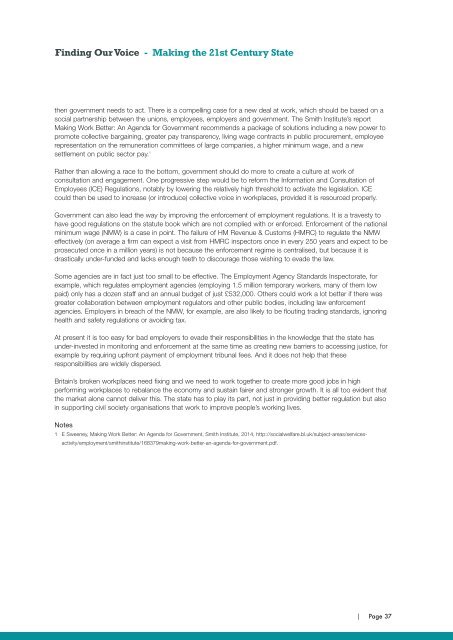Compass-Finding-Our-Voice-Final1
Compass-Finding-Our-Voice-Final1
Compass-Finding-Our-Voice-Final1
You also want an ePaper? Increase the reach of your titles
YUMPU automatically turns print PDFs into web optimized ePapers that Google loves.
<strong>Finding</strong> <strong>Our</strong> <strong>Voice</strong> - Making the 21st Century State<br />
then government needs to act. There is a compelling case for a new deal at work, which should be based on a<br />
social partnership between the unions, employees, employers and government. The Smith Institute’s report<br />
Making Work Better: An Agenda for Government recommends a package of solutions including a new power to<br />
promote collective bargaining, greater pay transparency, living wage contracts in public procurement, employee<br />
representation on the remuneration committees of large companies, a higher minimum wage, and a new<br />
settlement on public sector pay. 1<br />
Rather than allowing a race to the bottom, government should do more to create a culture at work of<br />
consultation and engagement. One progressive step would be to reform the Information and Consultation of<br />
Employees (ICE) Regulations, notably by lowering the relatively high threshold to activate the legislation. ICE<br />
could then be used to increase (or introduce) collective voice in workplaces, provided it is resourced properly.<br />
Government can also lead the way by improving the enforcement of employment regulations. It is a travesty to<br />
have good regulations on the statute book which are not complied with or enforced. Enforcement of the national<br />
minimum wage (NMW) is a case in point. The failure of HM Revenue & Customs (HMRC) to regulate the NMW<br />
effectively (on average a firm can expect a visit from HMRC inspectors once in every 250 years and expect to be<br />
prosecuted once in a million years) is not because the enforcement regime is centralised, but because it is<br />
drastically under-funded and lacks enough teeth to discourage those wishing to evade the law.<br />
Some agencies are in fact just too small to be effective. The Employment Agency Standards Inspectorate, for<br />
example, which regulates employment agencies (employing 1.5 million temporary workers, many of them low<br />
paid) only has a dozen staff and an annual budget of just £532,000. Others could work a lot better if there was<br />
greater collaboration between employment regulators and other public bodies, including law enforcement<br />
agencies. Employers in breach of the NMW, for example, are also likely to be flouting trading standards, ignoring<br />
health and safety regulations or avoiding tax.<br />
At present it is too easy for bad employers to evade their responsibilities in the knowledge that the state has<br />
under-invested in monitoring and enforcement at the same time as creating new barriers to accessing justice, for<br />
example by requiring upfront payment of employment tribunal fees. And it does not help that these<br />
responsibilities are widely dispersed.<br />
Britain’s broken workplaces need fixing and we need to work together to create more good jobs in high<br />
performing workplaces to rebalance the economy and sustain fairer and stronger growth. It is all too evident that<br />
the market alone cannot deliver this. The state has to play its part, not just in providing better regulation but also<br />
in supporting civil society organisations that work to improve people’s working lives.<br />
Notes<br />
1 E Sweeney, Making Work Better: An Agenda for Government, Smith Institute, 2014, http://socialwelfare.bl.uk/subject-areas/servicesactivity/employment/smithinstitute/168379making-work-better-an-agenda-for-government.pdf.<br />
| Page 37


